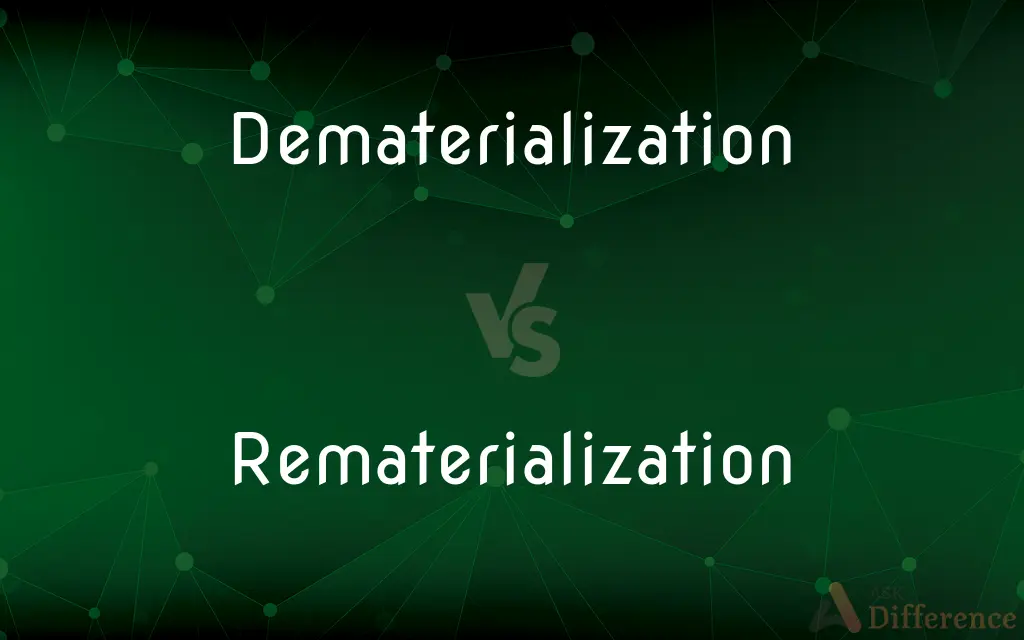Dematerialization vs. Rematerialization — What's the Difference?
By Tayyaba Rehman — Updated on September 21, 2023
Dematerialization refers to the process of converting physical documents into digital form. Rematerialization is the converse process, converting digital assets back into physical form.

Difference Between Dematerialization and Rematerialization
Table of Contents
ADVERTISEMENT
Key Differences
Dematerialization is often seen in industries transitioning towards digital operations, where physical assets, especially documents, are converted to digital formats. Rematerialization, in contrast, moves in the opposite direction, transforming digital assets back into their physical counterparts.
In the world of securities, Dematerialization is a common practice, turning physical share certificates into electronic records. Rematerialization, on the other hand, is less frequent, as it involves converting these electronic records of ownership back to paper form.
The drive towards a paperless society pushes many sectors to adopt Dematerialization, thus reducing costs and environmental impacts. Conversely, Rematerialization can be driven by specific needs, such as archival preservation or for collectors who value tangible assets.
Dematerialization generally promotes efficiency, reduces storage needs, and cuts down on potential losses or damages to physical assets. Rematerialization caters to scenarios where physical documents are required, either for regulatory, nostalgic, or tangible value reasons.
In essence, while Dematerialization is about embracing digital transformation and moving away from tangible assets, Rematerialization signifies a return to physicality, often driven by specific needs or values.
ADVERTISEMENT
Comparison Chart
Direction
Converts physical to digital
Converts digital to physical
Common Usage
In industries transitioning to digital operations
When physical copies are specifically needed
Efficiency
Increases efficiency and reduces storage needs
May decrease efficiency but serves tangible needs
Environmental Impact
Reduces paper usage, promoting sustainability
Increases paper usage, could impact sustainability
Purpose
Reducing costs, improving access, and enhancing security
Meeting regulatory requirements, archival, or tangible asset value
Compare with Definitions
Dematerialization
The process of reducing the use of tangible resources in operations.
Dematerialization has allowed companies to reduce their carbon footprint.
Rematerialization
Serving archival, regulatory, or nostalgic purposes.
Rematerialization is essential for certain historical archives that value original formats.
Dematerialization
Conversion of physical documents into digital form.
The bank began the Dematerialization of its records to save storage space.
Rematerialization
Re-introducing physical aspects in a primarily digital domain.
Art enthusiasts often lean towards Rematerialization for tactile experiences.
Dematerialization
Transitioning from physical to electronic in securities trading.
Stock exchanges now rely on Dematerialization for most of their transactions.
Rematerialization
The transformation of electronic records of ownership to paper form.
Some old-school investors prefer Rematerialization of their electronic shares.
Dematerialization
Enhancing efficiency and security by eliminating physical vulnerabilities.
The Dematerialization of patient records has reduced risks of data loss.
Rematerialization
Meeting specific tangible needs in industries.
For a vintage-themed event, the company opted for Rematerialization of digital posters.
Dematerialization
To deprive of physical substance; make immaterial
Medieval architects' attempts to dematerialize church walls into streams of light.
Rematerialization
Reverting digital assets back into physical form.
Certain legal processes required the Rematerialization of digital documents.
Dematerialization
To reduce the amount of material required for (a product or process)
Dematerialized the semiconductor industry.
Rematerialization
In computer science, rematerialization or remat is a compiler optimization which saves time by recomputing a value instead of loading it from memory. It is typically tightly integrated with register allocation, where it is used as an alternative to spilling registers to memory.
Dematerialization
To convert (records, for example) from paper to digital or electronic form.
Rematerialization
The act or process of rematerializing.
Dematerialization
To lose physical substance; become immaterial
The dry ice seemed to dematerialize as it sublimated.
Rematerialization
A compiler optimization that saves time by recomputing a value instead of loading it from memory.
Dematerialization
The act or process of dematerializing, or becoming immaterial.
Dematerialization
The substitution of paper-form securities by book-entry securities.
Dematerialization
A shift towards paperless solutions in industries.
The push for Dematerialization has been strong in the educational sector.
Common Curiosities
Does Dematerialization save costs for companies?
Yes, Dematerialization often reduces storage and maintenance costs.
What does Dematerialization primarily involve?
Dematerialization involves converting physical documents into digital form.
How does Dematerialization impact the environment?
Dematerialization reduces paper usage and waste, promoting sustainability.
Is Rematerialization common in stock trading?
While electronic trading dominates, Rematerialization is an option for those wanting physical certificates.
Why might one opt for Rematerialization?
Rematerialization may be chosen for regulatory, nostalgic, or tangible value reasons.
Share Your Discovery

Previous Comparison
Bobcat vs. Wildcat
Next Comparison
Production vs. ProduceAuthor Spotlight
Written by
Tayyaba RehmanTayyaba Rehman is a distinguished writer, currently serving as a primary contributor to askdifference.com. As a researcher in semantics and etymology, Tayyaba's passion for the complexity of languages and their distinctions has found a perfect home on the platform. Tayyaba delves into the intricacies of language, distinguishing between commonly confused words and phrases, thereby providing clarity for readers worldwide.
















































